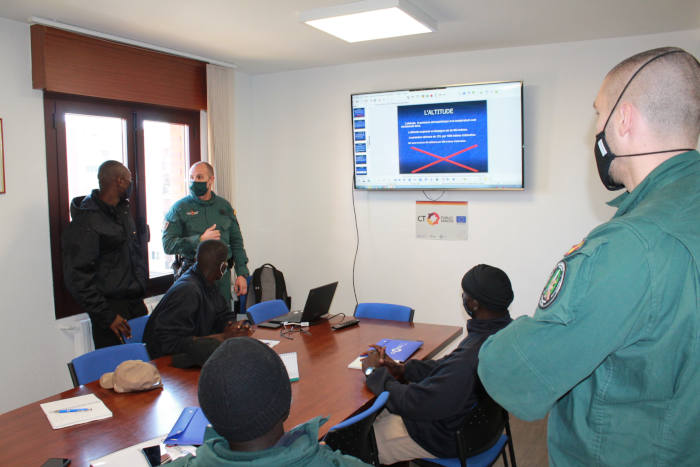-
04 February 2021
Category : Interview
“We must be prepared to prevent attacks and this is why we train”
The CT Public Spaces project, which is funded by the European Union, implemented by the Spanish Civil Guard and managed by FIIAPP, works on exchange, development and improvement related to the capacities of the professionals who are responsible for protecting public spaces in Senegal, Ghana and Kenya to strengthen their capacity to prevent and react to a possible terrorist threat.

We interviewed four representatives of the Senegalese police and national gendarmerie to learn, first-hand, about the content and impact of the training they received at the Civil Guard Special Forces Training Park (PEFE) in Logroño. This initial training will result in a team of trainers who, upon their return to Dakar, will pass on what they have learned with the support of project specialists.
What are the objectives of this training course?
This is an exchange of experiences financed by European cooperation, thanks to which members of the Senegalese police and gendarmerie have been able to come to work alongside the Spanish Civil Guard. Upon our return from the training, we will be able to put the acquired knowledge into practice in Senegal and, in turn, we will become instructors to pass on what we have learned to our colleagues in Dakar.
What activities are carried out as part of the training and what do they consist of?
The CT Public Spaces project deals with eleven different themes. In this specific training, we have worked on two of them, which are a theoretical-practical programme for precision marksmen and another for handlers working with assault and explosives detection dogs.
How will the training received here be used back in Senegal? What practical application does it have?
Once back in Senegal we will include what we have learned here in the curriculum of the main training programmes. In all our centres there are elite marksmen and dog handlers, especially in the police and gendarmerie special forces centres, that frequently receive staff for training in both specialties. Of course, the latter will also receive the training.
Is the training received appropriate to the Senegalese context, in terms of fighting terrorism and protecting public spaces?
Our day-to-day work in Senegal includes counter-terrorism preparation. We must be prepared to prevent attacks and that is why we train accordingly. This is why the training courses we received will be very valuable, so that, if one day there is a terrorist threat, we will know how to deal with it. For precision marksmen it is very useful, since they are exposed on the front line when there is a terrorist threat, which is very important. In addition, all anti-terrorism units have dog handlers. It is a win-win situation.
What was the most important part or teaching point of the training received?
Everything is very useful and it is undoubtedly an exchange we all gain something from. What has impressed us a lot is the professionalism that our Spanish colleagues have shown, both when we work on the theoretical part and when we work on the practical part. Because, of course, it is important to study and understand the theory behind each exercise, but it is even more important to be extremely professional and rigorous when it comes to putting it into practice, to be able to bring the situation under control immediately and effectively.
The views and opinions expressed in this blog are the sole responsibility of the person who write them.






